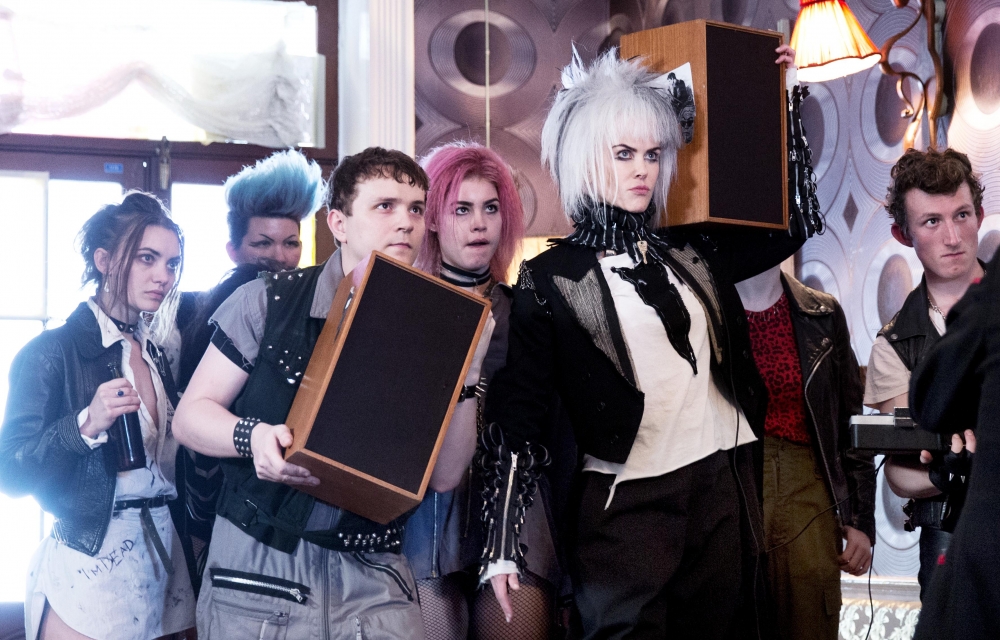
- Festivals
‘How to Talk to Girls at Parties’ – A Sci-Fi Punk-Alien Love Story
“Strange” (sounds better in French: bizarre) is the first label that comes to mind after watching How to Talk to Girls at Parties, from John Cameron Mitchell, which is an official selection (out of competition) of the 2017 Cannes Film Fest.
This romantic tale, which tries to mix the subcultures of punk and aliens in a sci-fi milieu, was one of the toughest press screening to get into (It took place at a small venue, Salle Bazin). Before the screening the expectations were high, after all this is Mitchell who gave use the innovative musical, Hedwig and the Angry Inch (first on stage and then as an indie musical movie with a cult following). Two hours later, the movie became a divisive event, with equal pros and cons.
Mitchell is a talented director: his follow-up to Hedwig, the very different feature Shortbus was also shown in Cannes in 2006. Then, in 2010, Nicole Kidman hired him to direct a tragic family melodrama, Rabbit Hole, and under his guidance she gave a strong performance that garnered her a Golden Globe Best Actress nomination. The source material here is a 2006 short story of the same title by author Neil Gaiman, which Mitchell adapted to the big screen with the help of Philippa Goslett.
On one level, How to Talk is a sci-fi period piece, set in 1977 in Croydon, a suburb of London, during Queen Elizabeth’s Silver Jubilee celebration. The first scene is rather promising in introducing a likable fella, Enn (well played by Alex Sharp, who looks typically Brit), a good-hearted, rather naïve punk, searching for meaning—and love—in the wrong place.
Disregarding the mysterious milieu of an alien cult, he falls hard for one of its members, the fresh and beautiful Zan (Elle Fanning, well cast). You expect of Mitchell to be daring—Shortbus included many hardcore sex scenes–but you also want him to be dynamic and energetic filmmaker, able to tell an engaging story with well-rounded characters.
At least one third of the tale is set in a dive-bar, featuring the Dyschords, a local band managed by Queen Boadicea (Nicole Kidman, in deliberately heavy makeup, gross behavioral mode, and foul lingo). Alex and his mate, the blond Vic (A.J Lewis) burst into a mansion, populated by odd youngsters who flaunt their flamboyant costumes–skin-tight black and red latex–as both a fashion and political statement. They are engaged in several dances, which look more like group gym exercises.
We never find out who they really are, where they come from, and what their philosophy–only that they are humanoids from another planet. Midway, the movie switches to the outdoors with some quieter moments, when Zan gets a break from the group, during which Enn and Zan develop their bond—and discuss their love, their future and that of their children.
The changes from one setting to another, and from one scene to another are erratic and will be perceived as incoherent by mainstream viewers. For example, Enn’s crass mother emerges out of the blue and turns out to be a very different person from the typical mom; then in a later scene, one of the leaders speaks through the voice and character of the mother. While the title may be misleading, the film is not mindless, and I think Mitchell intended to contrast two rebellious subcultures of the 1970s: the punks, who favor individualism, liberty, and free speech, and the aliens, here conceived as propagating conformity (in what may be an inside-joke).
Elle Fanning continues to show that she is not only exquisitely photogenic but also dramatically versatile. She can currently be seen in the gender-transformation drama 3 Generations, co-starring Naomi Watts as her mother and Susan Sarandon as her lesbian grandmother. There is good chemistry between her and Alex Sharp, a likable actor with an open face, but their parts are vastly underwritten.
Though lacking coherent or even semblance of plot, the movie is seldom boring, due to the restless camera that captures the colorful settings, eccentric costumes, loud punk music, S&M erotic gestures, and dialogue that is both ordinary and stylized.
As one colleague from Spain noted at the end of the screening: “This is the kind of midnight movie that the young John Waters (Pink Flamingos, Female Trouble and others) would have liked.”